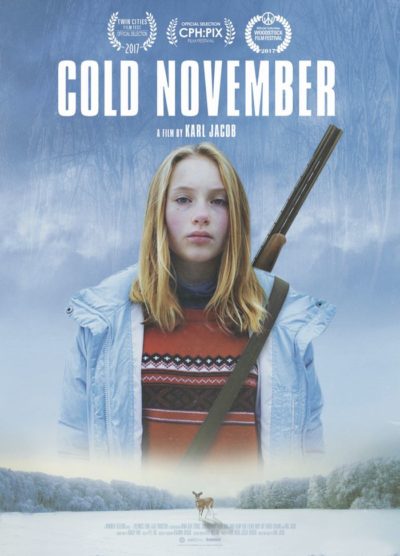★★★
“Deer Florence…”
 If you think children are of one mind with regard to the gun debate, thanks to the zealots of Marjory Stoneman, the alternative view portrayed by this movie will feel amazingly transgressive and almost alien. The world it depicts is one where schools will actually teach kids how to use guns safely, handing out gun permits, and a teenage girl can receive a treasured family heirloom, in the shape of a .30-30 rifle, passed down the generations. Hunting is a way of life, and an important resource, with a particularly strong matriarchal tradition, in which three generations of women will be going into the woods together. For 12-year-old Florence (Abas), it’ll be her first excursion: in a not-too-subtle parallel, she also gets her first period.
If you think children are of one mind with regard to the gun debate, thanks to the zealots of Marjory Stoneman, the alternative view portrayed by this movie will feel amazingly transgressive and almost alien. The world it depicts is one where schools will actually teach kids how to use guns safely, handing out gun permits, and a teenage girl can receive a treasured family heirloom, in the shape of a .30-30 rifle, passed down the generations. Hunting is a way of life, and an important resource, with a particularly strong matriarchal tradition, in which three generations of women will be going into the woods together. For 12-year-old Florence (Abas), it’ll be her first excursion: in a not-too-subtle parallel, she also gets her first period.
This is a very sober film, which takes guns and the culture around them extremely seriously, and that includes hunting, which is depicted in unflinching fashion. This is likely not a film for the committed vegan, in particular when Florence has shot her first deer and, in the absence of any immediate adult help, has to dress it. This is foreshadowed earlier, Florence’s aunt Mia (Fellner) teasing her when the young girl gets a bit squeamish about menstrual blood (and in particular, its uses in hunting): “You think that’s gross? Wait until you get elbows deep inside a deer.” As someone who tends to encounter raw meat only on polystyrene trays in the supermarket, it’s quite a shock – albeit also refreshing – to be reminded from where it comes.
On the other hand, the naturalistic approach eventually hampers the film, simply because so little of note actually happens. Up until the end, when Florence finds herself alone in the woods for a bit, virtually the sole bit of excitement is a small fire breaking out in the tree stand. This is not exactly an adrenaline rush. In Jacob’s defense, it’s clearly not intended to be: according to the director on the film’s Kickstarter page, “I noticed how the power of taking a life, butchering an animal, and meditating through the act was empowering. It changes you. It seemed clear that those who had not lived through this change have a fundamentally different experience of life.” However, quite what that “change” might be for Florence is not clear. How is her life “fundamentally different” as a result? We don’t really know.
The main difference seems to be that Florence is no longer visited by the ghost of Sweeney, her late sibling. This is another time the film’s opacity is a bit irritating: it’s suggested that Sweeney’s death was tragic, and perhaps even firearm-related. But would it have been too much to ask, for the film-makers to be a little clearer, on what appears to be an important point? Despite these criticisms, while it’s probably not a film I’d watch again, I didn’t feel it was 90 minutes wasted. Very much understated, this provides a glimpse into an environment not often depicted by Hollywood, one where guns are a tool, and not a threat.
Dir: Karl Jacob
Star: Bijou Abas, Anna Klemp, Heidi Fellner, Karl Jacob




